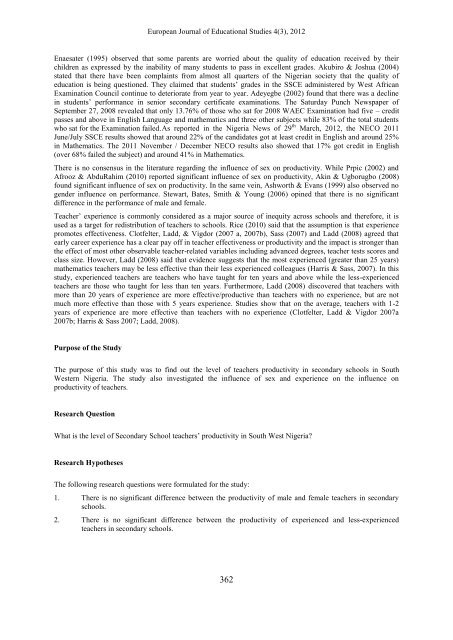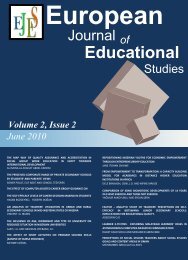Volume 4 Issue 3 (October 2012) - Ozean Publications
Volume 4 Issue 3 (October 2012) - Ozean Publications
Volume 4 Issue 3 (October 2012) - Ozean Publications
You also want an ePaper? Increase the reach of your titles
YUMPU automatically turns print PDFs into web optimized ePapers that Google loves.
European Journal of Educational Studies 4(3), <strong>2012</strong><br />
Enaesater (1995) observed that some parents are worried about the quality of education received by their<br />
children as expressed by the inability of many students to pass in excellent grades. Akubiro & Joshua (2004)<br />
stated that there have been complaints from almost all quarters of the Nigerian society that the quality of<br />
education is being questioned. They claimed that students‘ grades in the SSCE administered by West African<br />
Examination Council continue to deteriorate from year to year. Adeyegbe (2002) found that there was a decline<br />
in students‘ performance in senior secondary certificate examinations. The Saturday Punch Newspaper of<br />
September 27, 2008 revealed that only 13.76% of those who sat for 2008 WAEC Examination had five – credit<br />
passes and above in English Language and mathematics and three other subjects while 83% of the total students<br />
who sat for the Examination failed. As reported in the Nigeria News of 29 th March, <strong>2012</strong>, the NECO 2011<br />
June/July SSCE results showed that around 22% of the candidates got at least credit in English and around 25%<br />
in Mathematics. The 2011 November / December NECO results also showed that 17% got credit in English<br />
(over 68% failed the subject) and around 41% in Mathematics.<br />
There is no consensus in the literature regarding the influence of sex on productivity. While Prpic (2002) and<br />
Afrooz & AbduRahim (2010) reported significant influence of sex on productivity, Akin & Ugborugbo (2008)<br />
found significant influence of sex on productivity. In the same vein, Ashworth & Evans (1999) also observed no<br />
gender influence on performance. Stewart, Bates, Smith & Young (2006) opined that there is no significant<br />
difference in the performance of male and female.<br />
Teacher‘ experience is commonly considered as a major source of inequity across schools and therefore, it is<br />
used as a target for redistribution of teachers to schools. Rice (2010) said that the assumption is that experience<br />
promotes effectiveness. Clotfelter, Ladd, & Vigdor (2007 a, 2007b), Sass (2007) and Ladd (2008) agreed that<br />
early career experience has a clear pay off in teacher effectiveness or productivity and the impact is stronger than<br />
the effect of most other observable teacher-related variables including advanced degrees, teacher tests scores and<br />
class size. However, Ladd (2008) said that evidence suggests that the most experienced (greater than 25 years)<br />
mathematics teachers may be less effective than their less experienced colleagues (Harris & Sass, 2007). In this<br />
study, experienced teachers are teachers who have taught for ten years and above while the less-experienced<br />
teachers are those who taught for less than ten years. Furthermore, Ladd (2008) discovered that teachers with<br />
more than 20 years of experience are more effective/productive than teachers with no experience, but are not<br />
much more effective than those with 5 years experience. Studies show that on the average, teachers with 1-2<br />
years of experience are more effective than teachers with no experience (Clotfelter, Ladd & Vigdor 2007a<br />
2007b; Harris & Sass 2007; Ladd, 2008).<br />
Purpose of the Study<br />
The purpose of this study was to find out the level of teachers productivity in secondary schools in South<br />
Western Nigeria. The study also investigated the influence of sex and experience on the influence on<br />
productivity of teachers.<br />
Research Question<br />
What is the level of Secondary School teachers‘ productivity in South West Nigeria<br />
Research Hypotheses<br />
The following research questions were formulated for the study:<br />
1. There is no significant difference between the productivity of male and female teachers in secondary<br />
schools.<br />
2. There is no significant difference between the productivity of experienced and less-experienced<br />
teachers in secondary schools.<br />
362

















